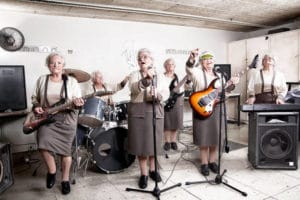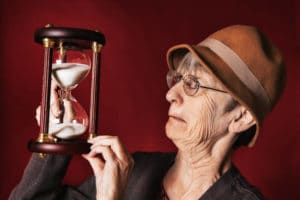In our performing society, if there's one time in life that most of us are desperate to put off, a time that makes us gloomy and anxious, it's our own old age. We look at our aging parents, thinking that after them it will be us. It will be us who will have white hair, brown spots on the skin and who will lose capacity. It will be us who will be ashamed of our age. But why are we so afraid of getting old?
What is the perception of aging according to cultures? What about fear of aging in women and men? And how do we master the art of old age?
The answer is right in the following article!
Youth obsession
In Western civilization, we are obsessed with speed, economic growth and youth. We spend a lot of money on anti-aging products. Imagine if this money would be invested elsewhere we could eradicate extreme poverty and make running water accessible all over the world.

But why this obsession to look young?
Is it because of an empty feeling we have inside us?
Anyway, this obsession interferes with being ourselves, takes away our wisdom, usefulness and real contribution.
In a society where physical appearance is very important, getting old is a little like not existing. This is what explains our deep-rooted fear of aging.
Why are we afraid of getting old?
Many of us are afraid of getting old because we fear:
- Of not being able to perform like before. As the years go by, with the coming of young people, we are scared to lose our place.
- Of not recognizing ourselves and to lose confidence in our physical appearance. When we look at ourselves in the mirror, we wonder who this man or woman who has gained weight is, with hands tingled with brown spots and that withered neck. And we say to ourselves: it's not possible, I'm dreaming! In fact, aging inflicts a narcissistic wound as it is difficult to mourn the attractive, healthy and performing body.
- Solitude and abandonment. We are scared to miss out on affection, tenderness, hugs and sexuality.
- That our mental capacity decreases. We are fearful that our memory fails us and that our thinking capabilities diminish.
- To lose our autonomy and be a burden for the people around us. Whether we like it or not, we cannot deny, aging brings about many losses, such as the professional status, driver’s licence and one’s residence. From mild to severe, these disabilities involve a lot of mourning and affect a lot of aspects of our autonomy.
- Illness and death. The fear of death, almost instinctive, contains several facets: the fear of losing one's physical integrity, the fear of premature death, the fear of the unknown, the fears linked to the suffering of agony as well as the fear for our loved ones.
On the other hand, stereotypes that we have about the elderly can lead to misinformation about aging. Studies have shown that by having a better understanding of aging demystified the fear of getting old.
Socializing with the elderly would therefore have a positive effect on how aging is perceived. This would help to decrease the anxiety caused by the physical changes, the loss of loved ones and the decline in health. This would suggest that the cultures in which generations reside together have a better perception of aging and less fear of getting old.

Perception of aging according to culture
In Western civilization, youth is highly valued and getting old is perceived as a debilitating experience.
But there are also cultures that traditionally celebrate old age:
- In the Greek culture, getting old is honored and celebrated, and the respect towards the elderly is very important in the family. Aging is associated with wisdom and a closeness to God.
- In the native American culture, there is an acceptance of death as being part of life. In several native American communities, the elderly people are respected for their life experience.
- In Korea, the young people have the task of taking care of the elderly in their family. It is also common to do a big celebration to mark the 60th or 70th birthday.
- In India, the elderly people are the head of the family. They have an important role in the education of the grandchildren.
The fear of aging in women (in the Western world)
While mature women today are better portrayed in the media, they are still at a disadvantage when it comes to their physical appearance. They are under a lot of pressure to remain young, beautiful and desirable.
With anti-aging creams, hair coloring, face-lifts, liposuction, eyelashes’ surgery and botox injections, we try to reassure and give ourselves the impression that we have control over our bodies. If all of these interventions reassure ourselves, their abuse could be like a never ending story. Because aging is inevitable. No one can avoid it.
The fear of aging in men (in the West)
Men are also afraid of aging, but their reality is quite different:
- For men, work has a dominating place in their life. Therefore, thinking about retirement scares them.
- Some men are afraid of losing their physical appeal: baldness, loss of muscle mass and weight gain.
- Other men fear erectile dysfunction.
Although it sounds cliché, we, man or woman, have an interest in developing our inner beauty. For it to emanate, we simply have to live the life that we want, to contribute to society, to celebrate one’s own wisdom and share one’s experiences.
How to master the art of old age?
What if instead of delaying the onset of the signs of old age, we learn to age well? For Cicero ( https: //www.renaud- bray.com/Livres_Produit.aspx?id=207856&def=Savoir+vieillir,CICERON,2869592558 ), author in the time of ancient Rome, the whole art of old age consists in being lucid first, not not exaggerate the fear of aging in order to see what it allows: wisdom, experience, self-confidence, knowledge of the world.
The art of aging consists of converting the fears of getting old into taking action. It’s the time to maintain one’s health and intellectual vigor, and to give advice and support to our loved ones and to engage with others. The art of aging it’s learning to recognize our power and to accept our powerlessness. It’s to become conscious that the passage of time is related to our views, fears and hopes.
Aging gracefully would therefore be a quest towards serenity. To be able to learn how to love ourselves from the outside to the inside. To know ourselves so we don’t judge or compare ourselves to others. To realize one’s limiting beliefs. To give more attention on what is going well at the present time and put more emphasis on the small joys in everyday life. Surround ourselves with loving and caring people.
The fear of aging: in conclusion
In this article, we have seen that the fear of aging is present in our Western society and is the result of a lot of anxiety. To free oneself from the youth culture, we have an interest to find inspiration from other cultures that celebrate getting old. In addition to examining the fear of aging, we also examined the art of aging.
In short, overcoming the fear of aging is to stay in touch with the desire to learn, to invent, to accomplish... in short, to be in the action. Because when you feel useful, the feeling of emptiness disappears. And as the Iranian poet Hafez says so well: "Everything we do, every thought, every action, is sacred."

One good way also to overcome the fear of aging consists of preparing oneself, like an artist in theater who concentrates on performing his last role with serenity. It’s the time where we will be able to go down the road that leads us to maturity before the final curtain.

Je suis heureuse de lire cet article sur le vieillissement. Au Québec, nous sommes le 3e pays au monde dans lequel il y a le plus grand nombre de vieux. Justement, pour les personnes intéressées par le vieillissement, hier soir j’ai écouté l’émission de Serge Bouchard et Jean-Phillipe Pleau « C’est fou ! Le cabaret du soir qui pense » sur le vieillissement première partie ( il y aura la suite dimanche prochain) à la radio de Radio-Canada Première à 19h tous les dimanches soir.
Hier, ils avaient invité François Grisé qui a créé une pièce de théâtre sur le vieillissement intitulée « Tout inclus » qui sera à l’affiche l’automne prochain. Cette pièce de théâtre est un documentaire sur le vieillissement. C’est aussi une réflexion sur la vieillesse « La vieillesse est-elle un sentiment ? »
Si vous vous voulez poursuivre votre réflexion sur le vieillissement, il y aura un Forum en ligne le 2,3 et4, février prochain intitulé : Forum Habitats », en ligne allez voir : http://www.forum-habitats.com
I’m really enjoying the design and layout of your blog.
It’s a very easy on the eyes which makes it much more enjoyable for me to
come here and visit more often. Did you hire out
a developer to create your theme? Fantastic work!
Hi! This post could not be written any better! Reading through this post reminds
me of my old room mate! He always kept talking about this.
I will forward this write-up to him. Fairly certain he will have a good read.
Thank you for sharing!
If some one needs to be updated with most recent technologies afterward he must be go
to see this website and be up to date all the time.
Wow, amazing blog structure! How long have you ever been blogging for?
you make blogging look easy. The overall glance of your web site is magnificent, as well as the content material!